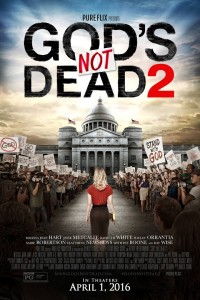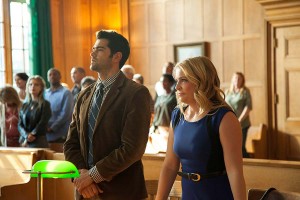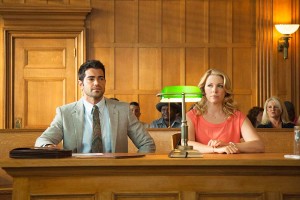
‘God’s Not Dead 2,’ much like its predecessor ‘God’s Not Dead’ (read my thoughts on ‘God’s Not Dead’ here), advances the idea that contemporary Christians are persecuted for their beliefs largely by atheists in positions of power. Christians in ‘God’s Not Dead 2’ are painted as martyrs under attack who can lose everything as a result of an atheist agenda to ‘prove God is dead once and for all,’ but ought to prefer (and welcome) persecution rather than ‘staying silent.’
Ms. Wesley, played by Melissa Joan Hart, is a public school teacher who responds to a student asking whether Gandhi and Martin Luther King Jr’s perspectives on non-violence were similar to those of Jesus. Rather than answering in the affirmative or dodging the question in some manner (rather than injecting religious teachings into a public school history class), Ms. Wesley quotes a Gospel verse in the classroom and is later reprimanded. Instead of apologizing and agreeing not to quote scripture as school board members suggest, Ms. Wesley is sued by the ACLU who ‘dreams of a case like this.’
Throughout the film, Pureflix, the film’s creator, presents many scenarios – both relevant to the main plot and not — which they believe are indicative of Christian persecution. A public school football coach objects to being asked to refrain from prayer and moments of silence at football games. A minister – also a juror in Ms. Wesley’s court case – is arrested for failing to produce documents related to his sermons (the movie doesn’t directly explain why he was issued with a subpoena, but whatever…). Christians talk about coming persecution that has been ignored which will culminate in government saying what can and can’t be said in churches. Saying ‘God bless you’ might result in breaking the law in time to come.
The movie’s ending encourages viewers to contact Alliance Defending Freedom if they are being ‘challenged for living their faith,’ presents a laundry list of cases in which people were allegedly persecuted, and encourages people to tweet with the hashtag ‘TheHumanRight’ joining a movement noting that silence is the enemy of truth. Christian band Newsboys sings ‘Don’t let them silence you. You’ll wish you spoke your mind’ and ‘When did it become a rule not to say your name in school?’ Newsboys lyrics also encourage people to be guilty, speaking about God even if it gets them convicted.
As expected, PureFlix, producers of ‘God’s Not Dead 2,’ once again paints atheists as vindictive, heartless, intolerant, and rude. Unlike previous Pureflix films, there are no scenes including a breakup between a couple because a woman is soon going to die (How could you do this to me? We had a commitment!) or an atheistic philosophy professor telling his Christian student that he’s going to take pleasure in failing him, but there are new scenes taking jabs at atheists.
According to the main character’s father or grandfather, atheism takes away hope (and also doesn’t take away the pain). Freethinking parents seem to show no grief following the death of their son and are just ‘over it’ following the loss – so much so that they don’t speak with their daughter about the loss on-screen, are merely focused on work-related tasks, and have ‘people from a charity place’ (for some reason they don’t mention The Salvation Army) collect the son’s possessions. A student, presumably an atheist, says he wouldn’t die for his beliefs and the Christian teacher notes that ‘some don’t have that courage.’

A father slaps his college-aged son across the face, tells him he has disgraced his family, disobeyed, says that he is foolish for throwing away everything his family has done, and that he is no longer his son…all for becoming a Christian. The son says that he is willing to throw away everything for Jesus (there’s that martyr encouragement again) and later opts to become a minister.
After a minister collapses in a courtroom, an atheist attorney says that this proves there is no god.
Parents engage in a lawsuit on their daughter’s behalf because they believe this will help her get into an Ivy League school through the prestige of being in the case and with the money won from judgment. They don’t bother to ask about her thoughts, though, and many talk about how she is a minor whose rights and views don’t matter in the eyes of the court. Atheists want to dismiss jurors who enjoy the television show ‘Duck Dynasty’ or who have have served in the military because they resemble ‘God and country.’
Cameos from Lee Strobel, Gary Habermas, Mike Huckabee, and other Christian authors grace the cast and courtroom. The case itself, involving some of these Christian authors, is painted as ‘faith being on trial’ and aims to prove Jesus was a historical figure (the defense maintains that if Ms. Wesley merely quoted a historical figure she was not preaching, but rather just answering a question). The author of a book ‘Cold Case Christianity‘ argues that the reliable eyewitness testimony of the Gospels is sufficient to establish Jesus was a historical figure and Lee Strobel says that because our calendar was split into A.D. and B.C. Jesus’ existence is vindicated.
Although the movie paints Ms. Wesley as being unfairly persecuted and her right to believe in God on trial, I think this description misses the mark. The movie actually presents a compelling case for Ms. Wesley’s remarks being constituted as an endorsement of religion and preaching in the classroom, but she is ultimately found innocent (did God intervene?) following a passionate dare from her attorney challenging the jurors to convict her: “In the name of tolerance and diversity, stomp her out!” He talks about how she should be the last spark of faith in society and that if people fail to hide their beliefs they should be arrested by ‘enforcement on the end of a gun.’

Ms. Wesley may of course engage in religious activity in her private life, but in her capacity as a public school teacher, she shouldn’t preach in the classroom. She’s not being sued because she is religious or because she merely mentioned Jesus, but rather because she unnecessarily quoted scripture in the classroom; she didn’t ‘just answer a question honestly’ as the movie argues.
After all, the atheist attorney noted in courtroom proceedings that faith and Christianity were not on trial, but rather Ms. Wesley was on trial for giving an endorsement of what she believes as a Christian. Ms. Wesley, he noted, took an innocent question and used it as a moment to preach similar to how a devout Muslim quoting the Koran in a class – chapter and verse – would be reasonably viewed as giving an endorsement of the Koran, presenting it as superior to other faiths. This all was lost on the film’s producers, though, but at least one line of reasonable argumentation was presented by an atheist in the film.
Even if one were to argue that there is a lack of merit in the lawsuit against Ms. Wesley, many Establishment Clause violations are apparent throughout America – some much more serious than a teacher quoting scripture in a classroom as a response to a student’s question…and these are not instances of faith being on trial, Christians’ rights being stomped out in the name of tolerance and diversity, or a campaign to prove that God is dead. Christians are simply not being persecuted in a manner this movie or other PureFlix films suggest.
Read more thoughts about this film on Friendlyatheist.com.
Read my thoughts on the PureFlix film ‘Do You Believe?’ here.